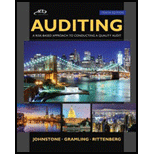
a.
Introduction: Auditing means the inspection of financial accounts of the company to determine if the records are accurate as per the rules and regulations of accounting or not. There are two types of auditors, i.e., internal auditors and external auditors, that carry out the
To describe:The unethical action that was taken by SB.
b.
Introduction:Auditing means the inspection of financial accounts of the company to determine if the records are accurate as per the rules and regulations of accounting or not. There are two types of auditors i.e. internal auditors and external auditors, that carry out the auditing process.
To compare:Independence in Fact and Independence in Appearance in light of the given case.
c.
Introduction: Auditing means the inspection of financial accounts of the company to determine if the records are accurate as per the rules and regulations of accounting or not. There are two types of auditors i.e. internal auditors and external auditors, that carry out the auditing process.
To comment:On the punishments faced by S.
Trending nowThis is a popular solution!

Chapter 1 Solutions
Auditing: A Risk Based-Approach to Conducting a Quality Audit
- Oxford Electronics has assets equal to $475,000 and liabilities equal to $312,000 at year-end. What is the total equity for Oxford Electronics at year-end?arrow_forwardI am searching for the correct answer to this general accounting problem with proper accounting rules.arrow_forwardThe variable factory overhead controllable variance isarrow_forward
- Please provide the accurate answer to this general accounting problem using appropriate methods.arrow_forwardAt the beginning of the year, Beacon Retail Corp. reported cash of $42 million, and by the end of the year, it was $34 million. The company's statement of cashflows reported cash from operating activities of $95 million and cash from investing activities of -$60 million. What amount (in $ millions) did the company report for cash from financing activities?arrow_forwardCan you solve this general accounting question with the appropriate accounting analysis techniques?arrow_forward
 Auditing: A Risk Based-Approach to Conducting a Q...AccountingISBN:9781305080577Author:Karla M Johnstone, Audrey A. Gramling, Larry E. RittenbergPublisher:South-Western College PubBusiness/Professional Ethics Directors/Executives...AccountingISBN:9781337485913Author:BROOKSPublisher:Cengage
Auditing: A Risk Based-Approach to Conducting a Q...AccountingISBN:9781305080577Author:Karla M Johnstone, Audrey A. Gramling, Larry E. RittenbergPublisher:South-Western College PubBusiness/Professional Ethics Directors/Executives...AccountingISBN:9781337485913Author:BROOKSPublisher:Cengage Auditing: A Risk Based-Approach (MindTap Course L...AccountingISBN:9781337619455Author:Karla M Johnstone, Audrey A. Gramling, Larry E. RittenbergPublisher:Cengage LearningBusiness Its Legal Ethical & Global EnvironmentAccountingISBN:9781305224414Author:JENNINGSPublisher:Cengage
Auditing: A Risk Based-Approach (MindTap Course L...AccountingISBN:9781337619455Author:Karla M Johnstone, Audrey A. Gramling, Larry E. RittenbergPublisher:Cengage LearningBusiness Its Legal Ethical & Global EnvironmentAccountingISBN:9781305224414Author:JENNINGSPublisher:Cengage




